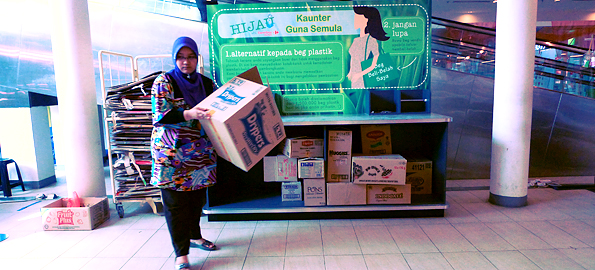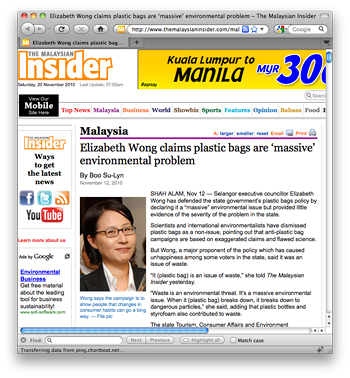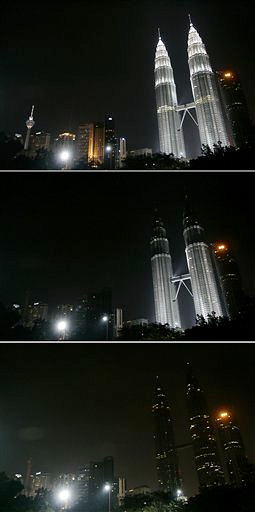SELANGOR’S No Plastic Bag Day campaign recently came under attack in a report on online news portal The Malaysian Insider.

The 9 Nov 2010 report claimed that “hypermarkets and retail shops” in Selangor have suffered up to 30% decline in their businesses on Saturdays since the Selangor government implemented the campaign in January 2009. In a 12 Nov 2010 report, the news portal also rubbished Selangor executive councillor Elizabeth Wong‘s claim, that plastic bags are an environmental problem, by citing environmentalists and scientists.
Are The Malaysian Insider reports accurate? Are they doing what good journalism is meant to do — hold public officials accountable for the decisions they make that affect public life? Or do the reports miss the point by taking things out of context?
Sloppy reporting
Interestingly, even though Penang has been more aggressive in implementing the campaign, the Selangor government has suffered most of the brunt from The Malaysian Insider’s reporting.
More interesting was how the news portal attempted to be critical of the Selangor government’s campaign. The news portal only cited three supervisors in its 9 Nov 2010 report that claimed “hypermarkets and retail shops” in Selangor had suffered up to 30% drop in businesses on Saturdays. It also quoted only customers that were unhappy with the state’s campaign.

In comparison, The Star‘s 11 Jan 2010 report in the campaign’s early days found that even though some shoppers were caught unaware, many were still supportive of the campaign. In addition, retailers like Tesco, Giant, Jusco and Ikea actually started encouraging its customers to use reusable bags even before the state government began its campaign.
It is also problematic when the reports stress a 30% loss in business on Saturdays without asking the question whether that loss in business has been compensated in an increase on other days. If it has, then the alarming claims that business has been affected by an environmental-friendly policy may be misguided and mischievous.

On top of that, The Malaysian Insider claimed in its 12 Nov 2010 report that scientists and environmentalists have dismissed plastic bags as a “non-issue”. To put things into context however, it is true that scientists and environmentalists have been critical of governments but only of those that focus on banning plastic bags alone without implementing more concrete and comprehensive plans to save the environment.
Hence, it is only problematic if the No Plastic Bag Day campaign were all that the Selangor government was doing in its effort to conserve the environment. That isn’t the case at all.
The Pakatan Rakyat-led government enforced a moratorium on logging in Selangor as soon as it came into power. The Selangor Forestry Department is taking various measures to prevent illegal logging.
The Selangor government also gazetted the Kota Damansara forest, Ayer Hitam forest, and the firefly sanctuary in Kampung Kuantan in 2010. The state is engaging on a long-term plan to rehabilitate the Klang River as well.
There is much more the Selangor government could do to conserve the environment but I believe credit should be given where it is due, too.
Small steps

Sceptics often criticise campaigns such as No Plastic Bag Day and Earth Hour on the basis that they merely create the illusion that small steps can make a difference. On my part, I would not be so quick to dismiss these small steps because they do help to increase awareness.
Additionally, reducing waste requires consumers to be constantly mindful of the impact of our actions so that we can choose to reduce our consumption at many levels. Symbolic campaigns like No Plastic Bag Day and Earth Hour may not save the planet, but I think they do serve to inspire consumers to a certain degree to rethink the impact of their consumption patterns on the environment.
Any environmentalist will tell you there is no one way to save the planet. Solving our impending environmental crises requires a fundamental shift in the way we think about and treat our environment.
Despite the urgency of these problems though, such change is expected to take decades. The least the media could do is to report on the issues as accurately and fairly as possible to contribute to meaningful debate and greater awareness about how our personal consumption choices can accumulatively save or destroy our planet. ![]()
Gan Pei Ling does not fancy picking up plastic bags or bottles in a beach or waterfall clean-up. She salutes those who do so regularly.
[related-posts]


KohJL says
I’ve been using my backpack for grocery shopping long before it became trendy here. I don’t get what is the fuss about.
Most hypermarkets and supermarkets allow you to push the cart all the way to the car anyway, where hopefully there are portable crates waiting in the boot for easy unloading later.
Jonathan Gan says
Way to go, Gan. The reporting by Malaysian Insider is biased and selfish. It cares for today, not tomorrow, nor the future generations. Keep it up, PL Gan.
Alvin says
Anyone who is ignorant or foolish enough to believe that our reliance on plastic bags has little impact on the environment needs to look up “Great Pacific Garbage Patch” on Google.
Crystal says
I moved to Malaysia from Washington, DC where this city also has a no-plastic bag campaign to save the river (you can buy a plastic or paper bag at the store but will pay $.05; this money goes toward river cleanup). I already had a habit of saving and reusing my plastic bags at home, but in Malaysia that collection grew too quickly! I’m shocked to see needless uses of them and often refuse them when I only buy small items that fit into my handbag. When I do plan to go shopping, I tuck reusable bags into this handbag; if I had a car (like I did in DC), I’d leave 2-4 reusable bags in the backseat for spontaneous shopping trips. It takes time to break old habits and form new ones, but it is possible. [Watch] the YouTube video titled “The Majestic Plastic Bag: a Mockumentary” to understand the importance of changing this habit.
I am surprised at the expense of reusable bags in Malaysia, however. I feel they are too expensive (around RM9+). There should be cheap options too (RM3) so people can choose these over repeatedly paying 20 sens per bag. Surely people will not AVOID shopping on no-plastic days when they have options to buy cheaper bags (and thus learn to bring these bags next time!).
I personally keep all giveaway bags from events and the few shops that give them out; my stock has grown to at least 6!
tze yeng says
Thanks for a well-thought out take on the issue. I agree that our environmental woes are solved only when we look at how we live and make small steps to make changes in our lives. Plastic bags are one small yet huge way of making that change.
Anon C says
If the Selangor govt is really into the environment, why is my local authority cutting down old trees in my area? I’m peeved with the plastic bag inconvenience, more so when I see the Selangor govt cut down old trees. Such an inconsistent, hypocritical stand.
Andrew I says
My only grouse is that no plastic days are hard to remember. An outright ban would encourage people to put reusable bags in their vehicles and put them back once they’ve emptied their groceries (which is what I’m doing now :-p)
I remember the time when people were moaning about pumping petrol d.i.y. Didn’t hear about a drop in the demand for petrol, then and now.
When you want to take away the pacifier, you just have to wait for the howling to die down.
Jacqueline Ann Surin says
Nice analogy: “When you want to take away the pacifier, you just have to wait for the howling to die down.” Well said!
Andrew I says
Well, thank you, Jacqueline.
It also goes to show that no political party has a monopoly on good ideas.
nobadreportingpls says
Thanks for the well-written piece. Unlike Earth Hour, No Plastic Day’s initiators (the Selangor govt) has been more consistent with the efforts as described in this article, which influences everyday people/shoppers more, instead of becoming a cheap platform for companies to greenwash. Some of the Earth Hour participants are companies with bad track records when it comes to the environment. For instance, a subsidiary of Rimbunan Hijau was one of the participants. Earth Hour has potentially become the biggest greenwashing event of this age with all the media hype – it’s an avenue for companies to ride on for cheap publicity.
Not only was TMI’s article biased, the erroneous title of ‘voter backlash’ decided upon by the editors is completely misguided. Either it’s just irresponsible and bad journalism, or an unseen spin-doctoring hand at play. I’m guessing it’s both.
abby says
This is a great critique of an article that I too found very perplexing for many reasons, but didn’t comment on at the time!! Nice job!
Annabelle says
Seems like they’re not done.
http://www.themalaysianinsider.com/malaysia/article/plastic-makers-gaining-from-pakatans-no-bag-days/
Tan says
Everyone should play a part in the conservation of the environment, including by not discarding rubbish indiscriminately. Although good deeds of a person will not change the environment overnight, the chain effects over time will definitely save the planet of ever-growing rubbish. Entrepreneurs should constantly think of substitutes to stay afloat in their businesses, including automation and use environmental-friendly materials in their manufacturing process, rather than be a crying baby when some policy change to safeguard the well-being of the masses affects them.
The world has been harping on environmental issues and reduction of the carbon footprint for a long time. Are we ready for the change or be changed?